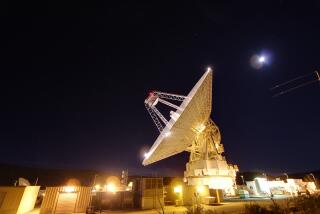âStar Warsâ May Harm Economy, Research Group Says
WASHINGTON â The Presidentâs missile defense plan could cause âsevere economic dislocationsâ in the United States, directing a disproportionate share of federal research funds to a handful of states and siphoning such funds away from projects with wide civilian applications, an independent research organization has concluded.
âThe entire direction of Americaâs high technology may be distortedâ by the missile defense program, charged Rosy Nimroody, who directed the study, âStar Wars: The Economic Fallout,â which is to be released today. The Strategic Defense Initiative, or âStar Warsâ as it is commonly called, âcould become our de facto industrial policy, shifting our research toward weapons development to the detriment of the future civilian technology base,â she said.
At the same time, the heavy concentration of SDI contracts in a few states with established high-technology defense industries means that âDetroitâs taxes end up financing Silicon Valleyâs SDI contracts,â Nimroody said in a report issued by the New York-based Council for Economic Priorities.
Congress Limits Program
The Administration had sought $5.7 billion this year for SDI but House and Senate conferees working on the Pentagon spending bill for the fiscal year agreed last week to limit the missile defense program to $3.9 billion.
The Council for Economic Priorities, a private nonprofit research organization, recommended that Congress trim the programâs budget to roughly $2 billion this year.
The Pentagonâs share of government funding for research and development has grown from 50% in 1980 to 73% this year, driven mainly by SDI, the study said. At the same time, Washingtonâs support for civilian research and development has shrunk by roughly 20%. The report said the Pentagon now oversees more than half of the government-sponsored research in mathematics and computer science and more than 80% of that in electrical engineering.
That could have âpotentially serious implications for our competitive position,â Nimroody said.
SDI projects employ engineers and scientists who might otherwise do research on technologies for the commercial market, the economist noted. And few production workers are employed to craft the special hardware used in the research program.
Spinoffs From Program Seen
Proponents of the missile defense effort have said the program will yield substantial spinoffs that will find their way into the civilian market. But the secrecy surrounding much of the program, and the programâs focus on developing specific hardware rather than fostering basic research, may limit the commercial value of many technologies explored under SDI contracts, the council concluded.
The research program also is causing a major shift in wealth toward California and other states with established defense industries, the report said. It noted that California leads five states that collectively have been awarded 85% of the major research contracts the Pentagon has awarded between 1983 and 1986 for SDI work.
Though Californians paid only 11.8% of the federal income tax that fuels SDI spending, the state netted 42.6% of the programâs principal contracts. SDI has netted California a total of $4.9 billion in research contracts since the President launched the program in 1983.
Director Defends Program
Lt. Gen. James Abrahamson, director of the Strategic Defense Initiative Office, Tuesday defended the research program, saying it consumes 0.25% of the federal budget. âWe are dedicated to making (defenses) affordable and effective,â he said.
Abrahamson and other proponents have not offered estimates of the systemâs costs once it is deployed, however. Some independent analysts believe that the comprehensive defenses the President has outlined could cost as much as $770 billion, requiring expenditures of $44 billion annually during the peak deployment years.
Speaking Monday to an insurance industry group, President Reagan underlined his Administrationâs commitment to deploying strategic defenses. âWe will research it; we will develop it, and when it is ready, we will deploy it,â Reagan said.
More to Read
Sign up for Essential California
The most important California stories and recommendations in your inbox every morning.
You may occasionally receive promotional content from the Los Angeles Times.











